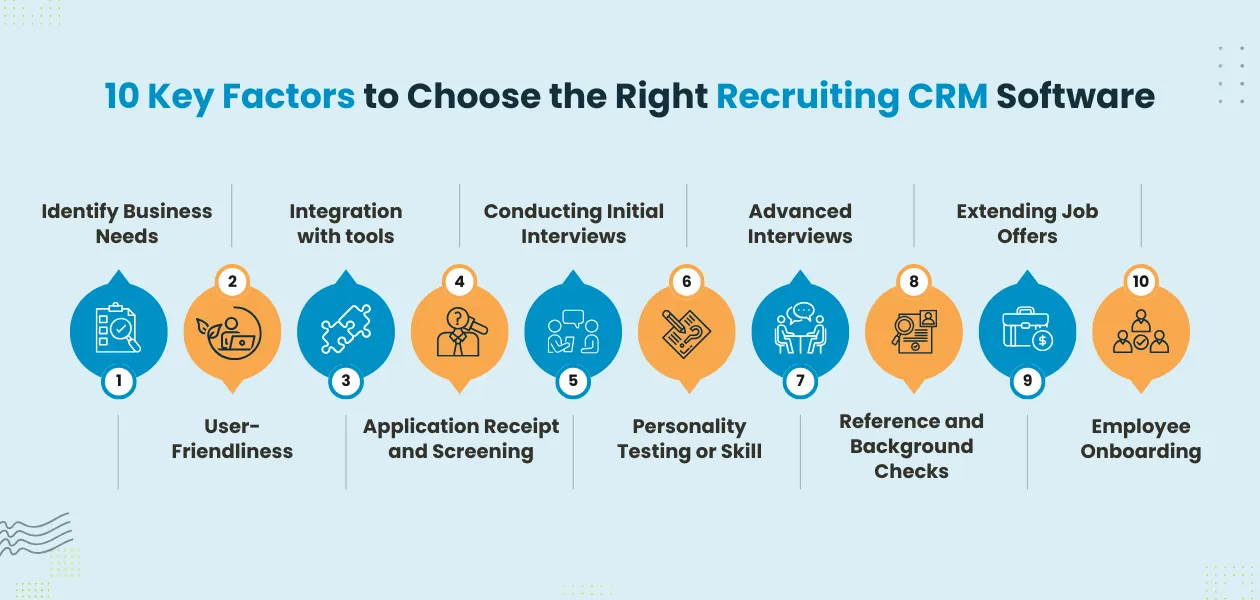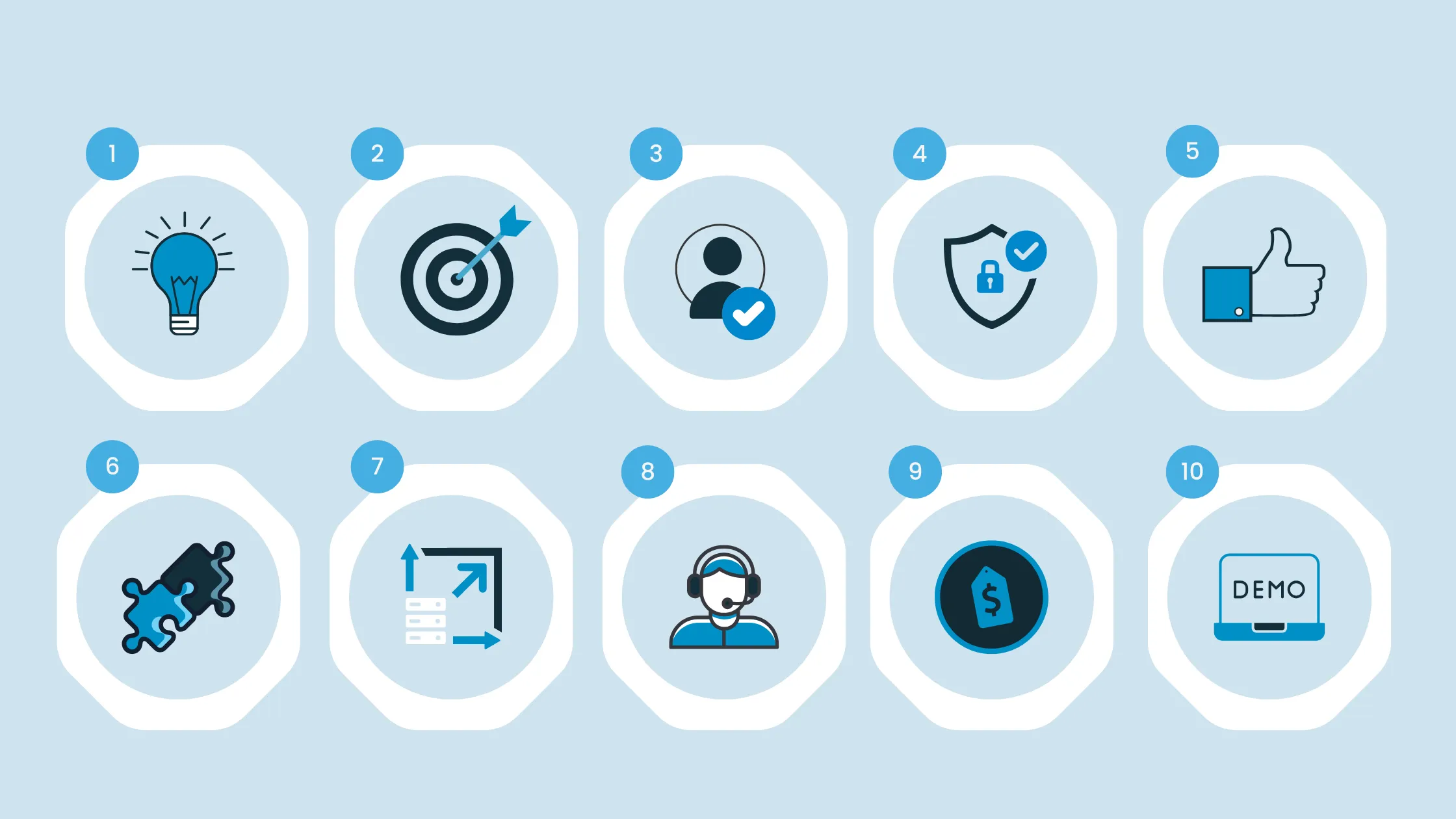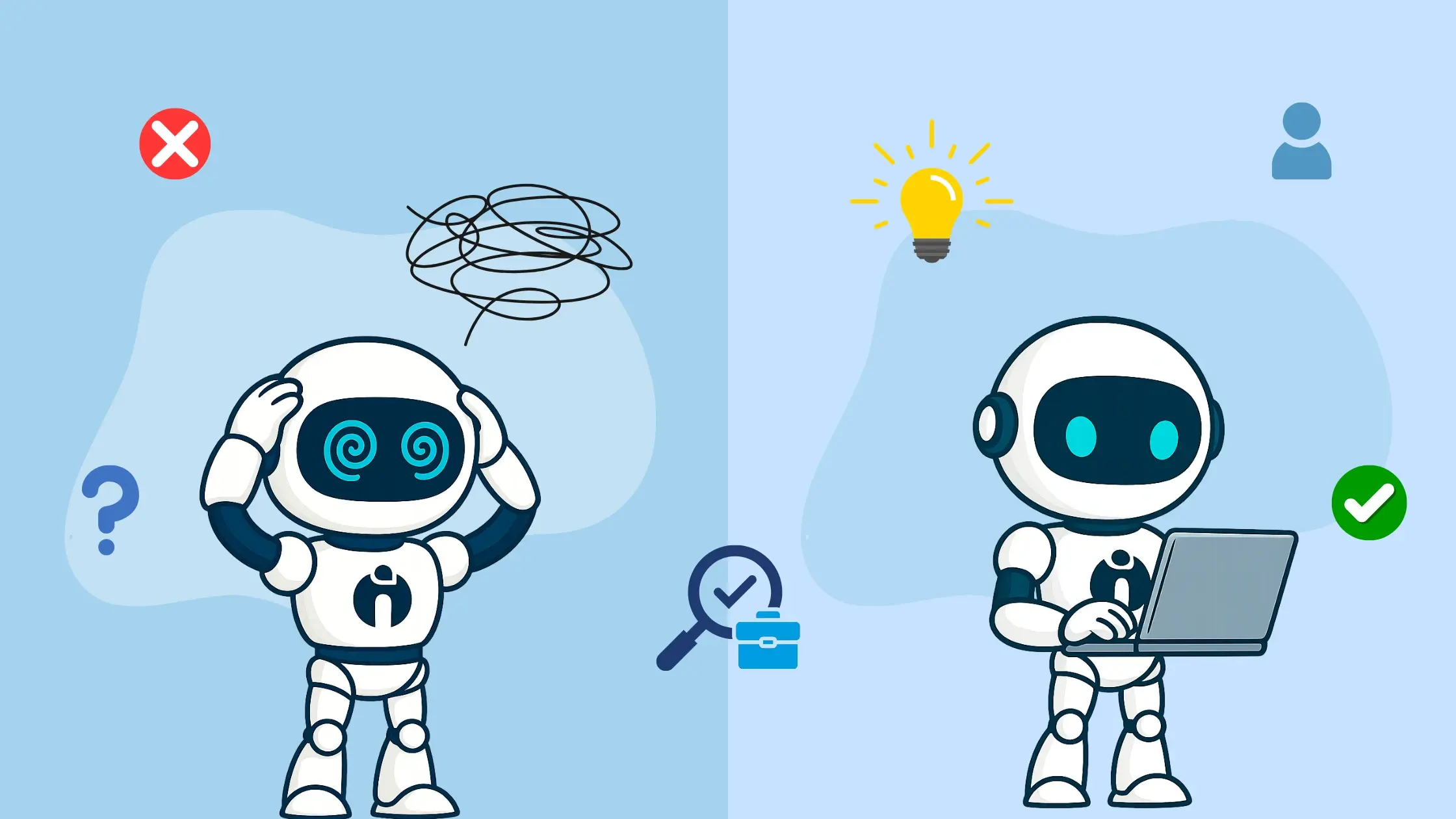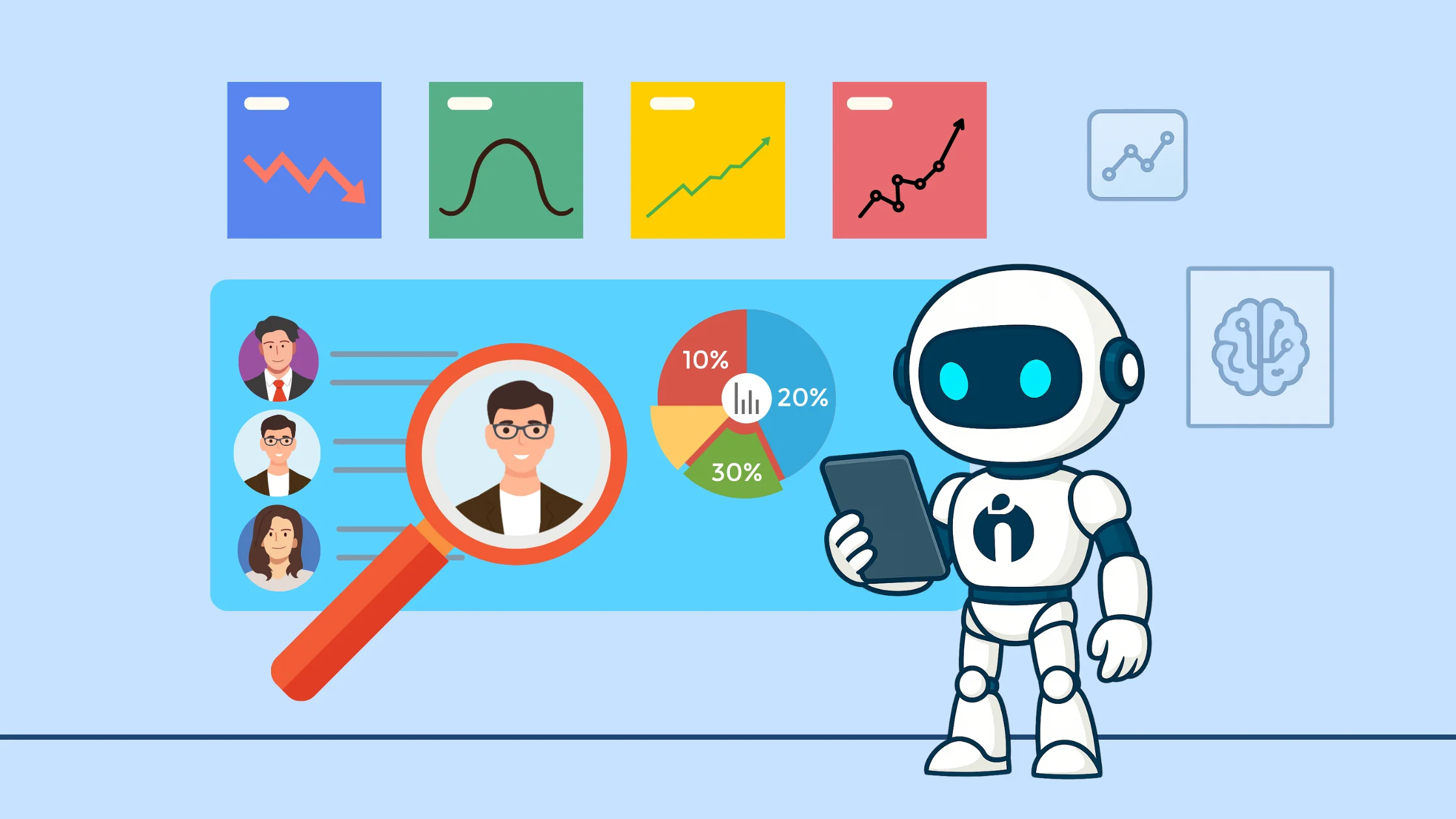TL;DR
- Recruiting CRM software streamlines hiring by organising candidate information and automating tasks.
- Key considerations include business needs, user-friendliness, integration with other tools, and data-driven recruitment.
- Scalability, security, customer support, pricing, and user reviews are crucial factors when choosing the right CRM.
- Trying free trials or demos helps ensure the CRM fits your needs and workflow.
Imagine speeding up your hiring process, connecting better with job candidates, and making smarter hiring choices using the right tool. Recruiting CRM software can help you do exactly that. It organises information about candidates, handles repetitive tasks automatically, and smooths communication. This CRM software for hiring solutions lets your team focus on the most important things. However, with so many choices, picking the best CRM for recruiters can feel overwhelming.
In this blog, we’ll walk you through the key factors to consider when choosing the right Recruiting CRM software. By understanding these essential elements, you’ll be able to make a smart choice that will make hiring easier and help you find and keep the best people for your team.
Key Factors to Consider When Choosing Recruiting CRM Software

1. Identify Your Business Needs
Every company has its way of hiring, and your CRM software should match your specific goals. Whether you’re a big company that needs to hire many people or a small business looking for specialised talent, the first step is figuring out what your business needs. Ask yourself:
- Do you need to handle a large candidate pool, or are you targeting a specific group?
- Is your recruitment process more about using data and analytics, or is building strong relationships with candidates more important?
2. User-Friendliness
Recruiters are often very busy and don’t need software that’s hard to use or requires a lot of training. It’s important to have a system with a simple and easy-to-use interface so your team can learn it quickly and work efficiently. The CRM (Candidate Relationship Management) tool should be straightforward, easy to use, and flexible enough to fit your team’s way of working.
Choose a system with a clear, straightforward design, and avoid platforms with too many features or confusing steps. A good Recruiting CRM should make your job easier, not harder.
3. Integration with Other Tools
Recruiters often use many different tools and platforms during the hiring process. Whether it’s an Applicant Tracking System (ATS), social media, or job boards, a Recruiting CRM must integrate well with the tools you already use. This helps ensure that all your data moves quickly between systems, keeping candidate information accurate and making communication smoother.
For instance, choose a recruitment CRM that integrates with popular job sites like LinkedIn, Indeed, or Glassdoor or tools like Slack, Gmail, or Outlook. Keeping all candidate information in one place without switching between systems will save your team time and reduce mistakes.
4. Data-Driven Recruitment
Recruitment data is one of the most essential tools in your hiring process. A good Recruiting CRM should provide clear and helpful information about your recruitment efforts. Whether it’s tracking time-to-hire, cost-per-hire, or the source of hire, having recruitment analytics at your fingertips will help you make smarter, data-driven decisions.
Choose a CRM with a simple and clear recruitment analytics dashboard showing your real-time data. It will help you track key performance indicators (KPIs), spot trends, find gaps, and see where you can improve your hiring strategy.
5. Scalability and Flexibility
As your business gets bigger, your hiring needs will change. It’s important to pick a Recruiting CRM that can grow with your company. The software should let you add more users, roles, and features as your team grows without causing significant problems for your work.
Besides being able to grow, flexibility is also essential. Your CRM should be able to adjust to your specific hiring process. Whether you’re focusing on using data to hire or managing different teams with different hiring needs, your CRM should let you customise workflows, job postings, and how you communicate.
6. Security and Compliance
Hiring involves dealing with private information about candidates, so your recruiting CRM software must follow data protection rules. Whether GDPR, CCPA, or other local privacy laws, your software must have strong security features like data encryption, safe cloud storage, and controlled access to keep candidate information safe.
Ensure the CRM vendor you choose follows the highest security standards and has the necessary compliance certifications. This will help mitigate risks and ensure your business complies with all regulations.
7. Customer Support and Training
Even the easiest-to-use Recruiting CRM software can take some time to learn. Good customer support and training materials are vital to ensure everything runs smoothly and everyone can use it well. Look for companies that offer:
- Onboarding assistance to help you get started quickly.
- Continuous 24/7 support, including customer service, available all day and night, and help fix problems.
- Training materials like online classes, guides, and instructions to help your team get the most out of the CRM.
Strong customer support ensures your team can fully utilise the automated recruitment workflows the CRM offers.
8. Pricing Structure
When choosing any software, the budget is always an important factor to think about. The cost of a Recruiting CRM can differ significantly based on the features, the number of users, and your company's size. It’s crucial to know how the CRM’s pricing works — whether you pay per user, per month, or if it’s a tiered pricing system.
Make sure the CRM you pick clearly explains the costs and that the software is worth the price for what you need. Look for Recruiting CRM options that provide a free trial or demo so you can test its features before deciding to subscribe.
9. Reviews and Recommendations
Before making a purchase decision, it’s smart to see what others think. Check out customer reviews, comments, or stories, especially those in your field. Focus on what they say about how easy the software is to use, the quality of customer support, and overall satisfaction with the software.
You can also contact other recruiters or businesses in your network to get recommendations based on their experiences with different Recruiting CRM systems.
10. Trial Period and Demo
A great way to check if a Recruiting CRM is right for you is to try it yourself. Many vendors offer free trials or demo versions of their software, allowing you to test out its features and functionality before making a decision. Use this chance to see if the CRM fits your needs, is easy to use, and works well with your existing tools.
Why iSmartRecruit is a Great Choice for Your Business
After considering all these points, iSmartRecruit stands out as one of the best CRM for recruiters. Its user-friendly design, seamless integration, and robust security features make it ideal for any business.
iSmartRecruit’s Recruiting CRM Software provides a complete, data-focused way to handle recruitment. Its strong security, customisable processes, and detailed analytics help your team stay organised, follow the rules, and concentrate on finding the best people. Additionally, with top-notch customer support and flexible pricing, iSmartRecruit makes it simple for companies of any size to get the tools they need to do well.
Conclusion
Choosing the right Recruiting CRM software is crucial for improving your hiring process. By thinking about important things like your business needs, how easy it is to use, and how well it works with other tools, you can make hiring smoother, better decisions, and build stronger connections with candidates. A good CRM will make your work easier and improve hiring efficiency, helping you find and keep the best people. Take your time to look at all aspects of Recruiting CRM guide to get better results and improve your hiring strategy.
FAQs - Frequently Asked Questions
What is Recruiting CRM software and how does it help?
Recruiting CRM software organises candidate information and automates tasks, helping recruiters communicate better and speed up hiring. It allows your team to focus on finding the best talent efficiently and effectively.
How does iSmartRecruit stand out among other recruiting CRMs?
iSmartRecruit offers a user-friendly interface, smooth integration with popular tools, strong security features, and excellent customer support. It adapts to your hiring needs and scales as your business grows.
Can Recruiting CRM software integrate with other recruitment tools?
Yes, good recruiting CRMs like iSmartRecruit integrate with applicant tracking systems, job boards, and communication platforms. This integration keeps all candidate data in one place, saving time.
Why is data analytics important in recruitment CRM?
Data analytics allows you to track key hiring performance metrics, identify trends, and make evidence-based decisions. It helps improve your recruitment strategy and find candidates faster.














